REFLECTIONS
OF SOME TYPICAL
MEMBERS (AND PARTNERS)
The following statements were supplied
voluntarily by members of Marin Man to Man and their partners.
No one is required
to "go public" via this web site, and all information discussed at the
weekly meetings of our support group is considered to be confidential.
Geoff Nichol
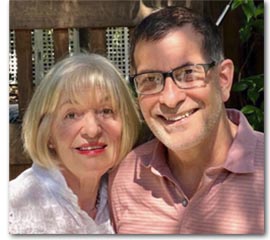 Geoff: When my wife Julian was first diagnosed with localized breast cancer about 15 years ago, her oncologist said after her treatment: “You’re good for 10 years.” Geoff: When my wife Julian was first diagnosed with localized breast cancer about 15 years ago, her oncologist said after her treatment: “You’re good for 10 years.”
What he meant was that as good as treatments for early-stage breast cancer are, it can still come back. This came home to us recently when Julian’s cancer recurred, a process that extended over two prolonged periods of tests, biopsies, surgeries and agonizing uncertainties that threatened to upend our lives together.
In the depths of those uncertainties, I decided to find some companions on the journey, and joined Marin Man to Man. I found a group of men whose experiences of their partners’ cancers and other life-threatening diseases have often been more tragic than mine, but whose courage, humor and fellowship is unmatched.
I haven’t been able to make every weekly meeting, but every time I can, the conversation not only covers our ongoing struggles but digresses into whatever else is happening in our lives and the world around us — full of interest, humor and the little-spoken wellspring of support that male companionship can provide. Since earliest time, “bands of brothers” have faced all manner of common adversities together. Marin Man to Man continues that tradition for those with partners with cancer and other serious illnesses.
If you are there in that dark place, man up and come join us!
G. Paul Hendriks
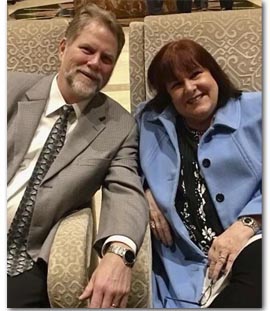 Paul: My wife returned from her GP doctor, sat across from me, preparing me for bad news. The dreaded words, although muffled, were heard in disbelief, and we both cried. A whirlwind of questions, next steps, oncology doctor visits, fighting with an insurance company to obtain tests, and then the awful wait. Paul: My wife returned from her GP doctor, sat across from me, preparing me for bad news. The dreaded words, although muffled, were heard in disbelief, and we both cried. A whirlwind of questions, next steps, oncology doctor visits, fighting with an insurance company to obtain tests, and then the awful wait.
Anxiety-ridden for weeks, we received the confirmation, Stage 3 non-small-cell lung cancer. The oncologists immediately pounced on a treatment regimen of two-drug chemotherapy infusions along with seven weeks of radiation treatments. They say she can beat it. Brutal treatments sapping appetite, energy, focus and willpower. At times, I barely recognized my wife as she lay listlessly in bed.
I thought I was going to be strong and handle this horrible journey with some help from my grown kids, my wife’s sisters, and my brother-in-law. Joining a support group was the last thing on my to-do list. Months into the trek, I cracked at least four times. Helplessness, frustration, and angry outbursts at total strangers who may have deservedly earned my scorn eventually led me to realize I needed to not only protect my wife, but also myself.
Marin Man to Man has provided comfort with both informational and emotional support. These guys have all coped with stresses of being the primary care provider to their wife/partner. Most of us seem to be “old school” guys who want to portray strength, especially when faced by life’s difficulties and other men. We have shared very difficult past and current journeys. Best way I can sum up my experience: Camaraderie in the face of crisis.
Bruce Macgowan
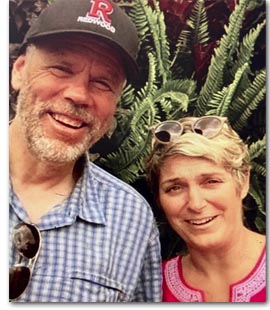
Bruce: I’ve watched my wife battle metastatic breast cancer for six-plus years — bravely and calmly.
Through incredible will power, she’s been able to deal with the sometimes-debilitating effects of the medications she takes and will have to take for the remainder of her life.
Colette, indeed, has continued to live her life the way she always has, doing the things she enjoys: working, helping to raise our daughter, and diverting herself when possible with hobbies such as gardening and pottery.
But to be honest, I wasn’t nearly as brave or calm about her challenging situation. When I first heard about it, I was stunned, especially after I learned it had already spread. Within a few days, I was confused, sad, upset, angry and sometimes even unwilling to accept her prognosis. That was why I sought out the support offered by the weekly Marin Man to Man group.
Going to the weekly Marin Man to Man meetings really helped put me back on an even footing. I learned there were other guys in the county who had been through this trauma before. I took comfort in the fact that they, too, needed the counsel from others and that we were all in pretty much the same boat.
Between Woody Weingarten and some of the other fellows I met who were interested in and listened to my story, I was able to take a breath and calm down.
Yes, this was and still is a serious situation, but I now realize that cancer is not a death sentence, and that my wife has the best care and the best attitude and will continue to deal with this terrible twist of fate in a positive manner.
Colette’s strength of character actually buoyed me throughout — and even more later on when I suffered a cancer of my own.
I had experienced blood in my urine for several weeks, and when I finally got it checked out, the urologist discovered a small nodule in my bladder and removed it to conduct a biopsy.
A few days later, I was hiking on Mt Tam with a buddy of mine when I got the call on my cell phone that no one ever wants to get: “You’ve got bladder cancer. You’re going to have to have two months of chemo, then a delicate five-hour operation to remove your bladder and prostate. You’re also going to need to take at least two to three months off of work.”
As I listened to the details, I became agitated and angry. I yelled into my phone as my friend Herman looked over at me, wondering what was going on.
My reaction may, of course, have been heightened from watching my wife’s battle but watching her cope with her situation made my ordeal a lot easier to handle.
As for the operation, the doctors told me that I was lucky because they got the tumor out early and there was no other sign that the cancer had spread. When I was told that, I felt relieved, but not exultant.
Then, when I was flattened by the chemo, and later when I was recovering from my surgery, who was there to nurse me, encourage me and try to keep me even-keeled? Colette. It was like having a coach, someone who had plenty of experience to reassure me that it was going to be all right.
I really don’t know what I would have done if I had not had her support and positive vibes. Watching her go through her ugly ordeal made me realize that my cancer, while serious, was practically a walk in the park compared to what she has been dealing with.
Has cancer changed me? The simple answer is yes. I appreciate Colette now more than ever as she continues to do surprisingly well.
We share the same oncologist and he has told us that we’re his “superstar couple,” because we both continue to stay strong and confident. My cancer is gone and according to the doctors, will probably not return, and Colette’s cancer remains in a holding pattern, as the small tumors in her lungs have not grown since they were discovered.
But perhaps more than anything, both Colette and I appreciate our lives. We never take for granted a single day that we’re here. And we realize that when you’ve been dealt a tough hand, you do the best. So far, so good for the Macgowans!
Stan Cohn / Roxanne
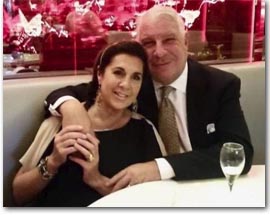 Stan: My wife Roxanne and I have known each other since the age of 10. We grew up together in the Bay Area, went to the same universities and were married in 1985. We raised three lovely children — Peter, Gabrielle, and Matthew — in Kentfield, a sunny suburb of San Francisco. In so many ways, our lives were charmed…until that fateful day in January of 2014.
Roxanne had scheduled a routine mammogram in late December 2013. A week later, we received a call suggesting that she come in for a follow-up visit and biopsy. Expecting a clean bill of health, she boarded a flight to Washington, D.C., to visit our daughter, who worked at the White House as an intern.
My cellphone buzzed a few days later. It was Roxanne’s physician. “Stan, I reviewed Roxanne’s biopsy and wanted to call you with the results.” My heart raced. “Roxanne has triple-negative breast cancer, and I recommend that we schedule surgery immediately.”
A tear dripped slowly down my cheek. How is this possible? I knew so little about breast cancer, but our physician told me it could be fatal if not addressed immediately.
When I called Roxanne that morning, she was sitting on a bench by herself on the snowy White House back lawn. Overwhelmed, as we spoke over the phone, she cupped her head in her hands and wept about her uncertain future.
We called experts for advice: CPMC, UCSF, The Cleveland Clinic, HD Anderson, UCLA, friends and experts we had gotten to know over the years. We ultimately put together a team from CPMC, UCSF, and UCLA to direct Roxanne’s care, including surgery, chemotherapy, radiation, and several experimental treatments, like the Dignicap program.
Now, years since her diagnosis, Roxanne is considered healthy, happy, and very grateful.
Throughout Roxanne’s treatment, I was privileged to join Marin’s Man to Man group, which helped me get through the fear, anxiety, and, yes, sleepless nights. Group members, now friends, offered sage advice, and still do.
In many cases, I found the medical community, including the psycho-oncologists who provided welcomed therapy, unable to answer many of our questions: How should I explain Roxanne’s condition to our children?
Are there things I can do to not only support Roxanne, but ways in which I can address my own psychological needs?
Will our lives ever be the same?
That’s where my friends in the Marin Man to Man group stepped in — ever sensitive, experienced, and at times humorous…when laughing served as the best antidote.
They helped me understand what to expect, what to tell my children, our families and close friends. They taught me the value of hope, and that I am not alone in walking down a path we never expected.
Roxanne: As a cancer survivor (thriver!), I look back on my life over these past years, feeling ever grateful for the care I was provided by my doctors, friends, and family. Stan and my children were always by my side, offering unbridled hope and support. We beat my cancer as a team, and while it was a difficult journey, I also learned so much about the people in my life who truly care for me.
I have a new family, those women and men who, like me, have suffered the shock of being diagnosed with breast cancer. I have tried to give back to my community by attending special breast cancer events and fundraisers, but it is important to me that I also offer the care I received to others who are now in need.
Each family goes through cancer in its own way. As for my husband, he benefitted so much from his weekly breakfasts with his Marin Man to Man gang. He would often come home from those meetings brimming with new insights and the awareness that life will and must go on.
Woody Weingarten / Nancy Fox
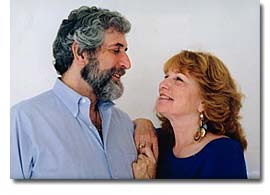 Woody: "Nancy's all right but the tumor
was cancerous," said the surgeon. Woody: "Nancy's all right but the tumor
was cancerous," said the surgeon.
"Oh, God," I thought. "Why
her? Why her?"
I couldn't cry. I couldn't scream. I wanted
to do both.
"We believe we got it all," said
the doctor, later indicating we could expect at least one more
operation — the removal of lymph nodes.
It would be a while before I'd learn about
the unholy cancer treatment trio, "slash, poison and burn."
When she first undraped her right breast
for me a little later, I stiffened. The lumpectomy gash extended
several inches. I inspected it with my eyes, afraid to touch
it lest a microbe on my fingertips infect the wound. After staring
for a few seconds, I relaxed. "If that's the worst that'll
happen, we're lucky as hell," I said.
But I was scared.
My anxiety directed me to this men's
group, Marin Man to Man, a unique drop-in support club for guys
whose partners have breast cancer.
It quickly met its promises to be "a sympathetic forum to
discuss and understand the challenge for the man to be supportive
and loving, and to reassure the woman that both she and their
relationship are likely to survive."
Common problems, I found, can activate
bonding.
Nance labeled her first chemo session "the hardest day I've ever had in my life." It wasn't exactly my easiest. I felt as
if a kickboxer had launched a full-strength attack on my stomach, but the men in this support group understood
every nuance, and were there to listen to my inner scaredy-cat.
Later, the first of 33 radiation days gorged
us with emotion.
My stomach became a volcano near the point
of discharging its lava.
Again, as always, the members of Marin
Man to Man were there to allay my fears.
A full 25 years after her diagnosis, Nancy had a recurrence. She needed a mastectomy this time rather than a lumpectomy. Two years after that, she was diagnosed with metastatic breast cancer in a lung. Both times, the guys were there to support me while I supported her.
Over the decades, our dues-free meetings usually corralled fewer participants than could be counted on the fingers of one hand, mainly because most men apparently are hesitant to share their insecurities, to admit they can't fix everything, to shed their machismo.
But whenever I become frustrated because more
men don't seek the help they obviously need, frustrated because
of the large number of guys who came once or twice and never
showed up again, the words of the group's founder reassured me.
"Those who drop in and don't come back," he said wisely,
"take whatever they need and get support elsewhere."
And then, of course, there are the "lifers,"
the stalwarts who stay in Marin Man to Man year after year, to
aid and comfort others the way they themselves once were helped.
My book, Rollercoaster: How a man can survive his partner’s breast cancer, which focuses on how caregivers and patients can handle the disease, its treatments and aftermath, is available at Amazon. And updates on topics covered by Rollercoaster can be found on either of my websites, woodyweingarten.com or vitalitypress.com. Anyone interested in talking with me about any of that can call me at 415-459-3434 or write to me at info@Marin-Man-Man-Man.org or voodee@sbcglobal.net.
Nancy: Since my first bout with cancer sucked up all of my energy, physically
and psychologically, I know I was not "available" in
many ways to comfort my husband, a role I generally assume as
his wife.
I was too scared, hurting, focused on my
own healing, schedules, aches and pains to deal with "how
it was for him." I just wanted him to be there. And he was.
I should have known he was equally frightened,
but I didn't.
I should have known he needed to talk about
it, but I was the wrong audience.
I should have been able to be there for
his concerns, but I wasn't. I was too wrapped up in my own.
There were even times when he accompanied
me to my chemotherapy sessions that I wished he weren't there.
I didn't want him to see it. I didn't want to worry about his
reactions to what was going on. And I couldn't even tell him
that at the time, because I didn't want to hurt him, since he
was being so sweet and loving.
So, when we found out about Marin Man to
Man, I was thrilled. Elated. Beside myself. A place for him to
go. A place to vent with "the guys." A place for him
to articulate all the stuff that was swirling around in his introspective
head.
And, it turned out, it was also a place
for him to help other men who were going through the same thing
with their wives and partners.
I know he looks forward to these
meetings. He rarely misses them.
Woody needs the outlet. He needs the guys.
He needs the place to say, "I was really scared, and I understand
your fear. Here's what worked for me."
Other men who are going through it need
him — an emotional, expressive guy who's not afraid to say,
"I was scared."
John Teasley
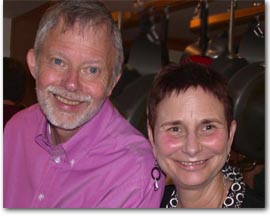 John: Mary, a co-worker many years ago, was diagnosed and treated for
breast cancer. Being a Texas-bred male, I was taught to ask no
personal questions nor show any emotions. I foolishly assumed
that since Mary returned to work and looked OK, she would be
fine. In casual encounters, we skirted any discussion of her
illness, but she continued to stress her good health, strong
family/friends' support, and she constantly exuded happiness.
A couple of years later I received information on her funeral
arrangements. John: Mary, a co-worker many years ago, was diagnosed and treated for
breast cancer. Being a Texas-bred male, I was taught to ask no
personal questions nor show any emotions. I foolishly assumed
that since Mary returned to work and looked OK, she would be
fine. In casual encounters, we skirted any discussion of her
illness, but she continued to stress her good health, strong
family/friends' support, and she constantly exuded happiness.
A couple of years later I received information on her funeral
arrangements.
Chris, another co-worker of years past,
was diagnosed and treated for skin cancer. We likewise skirted
the health issues while maintaining a casual friendship. My wife Jill and I attended Chris and Peter's wedding. The love
and devotion, probably increased by the cancer ordeal, was obvious
and endearing.
One morning, Jill awoke with a pain in her
breast. Not overly concerned (breast cancer does not hurt —
so they say), she called the doctor. "Not to worry,"
he said, "you probably strained something. Give it a couple
of weeks." Two weeks later she was in for a needle biopsy,
which proved inconclusive. Next came the surgical biopsy, delayed
once, allowing us a very stressful Christmas holiday. The surgical
results were conclusive — breast cancer.
Friends provided support, as did family,
although most of mine are still in Texas. Double mastectomy,
reconstructive surgery and chemo -- we survived them all and
embarked on our new life.
Peter called one evening — Chris had just
passed away. I had no idea that she suffered a recurrence, but
had kept them informed on Jill's situation. Chris had kept my
notes about Jill at her bedside, constantly hoping for the best
for Jill.
That did it — I needed help coping, not
with just Jill's survival, but also mine. Jill's support group
knew about the Man to Man group, and told me about it. I swallowed
my pride and went to my first breakfast.
Small world that it is, the founder was Mary's brother.
Yes, it's a shaggy group. We discuss anything from current events;
current "manly" projects around the house; and, of
course, anything that may be surfacing as a result of our beloved
survivors.
Has it helped me? YES. It has provided a sounding board for sensitive health
issues and made me realize that I was not alone in my ordeal
or fears.
Will it help you? I can't say, but you
won't know unless you give it a chance. Jill finished chemo years ago, but we still
cringe every time there is a new pain, bump or strange ailment.
Since Covid, the group has been meeting via Zoom. Once the newness wore off, I found it a better vehicle for some of our intimate conversations. We now laugh and cry as we share our feelings.
Gerry Bourguignon
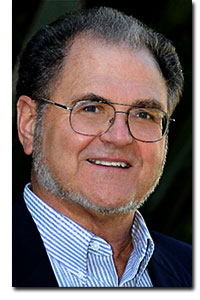 Gerry: I had noticed a small lump in my right breast. It was a bit uncomfortable and not going away. Fortunately, my primary care physician was very aware that breast cancer can occur in men; and, after carefully examining my breast, he ordered a mammogram to be done as soon as possible. Gerry: I had noticed a small lump in my right breast. It was a bit uncomfortable and not going away. Fortunately, my primary care physician was very aware that breast cancer can occur in men; and, after carefully examining my breast, he ordered a mammogram to be done as soon as possible.
The mammogram indicated that the lump was “suspicious,” which meant it should be biopsied. The biopsy showed that the cells in the lump were abnormal (i.e. cancer cells), which meant that surgical removal was necessary.
Successful surgery (a modified mastectomy) was performed at Marin General Hospital by a superb breast surgeon (Dr. Cheryl Ewing). The tumor was completely removed, and there was no spread of the cancer cells to the nearby lymph nodes.
A special test for predicting recurrence of breast cancer (Oncotype Dx) was run on my tumor tissue; to my great relief, the results of this test indicated a very low probability of cancer recurrence — without chemotherapy or radiation treatment.
My oncologist then recommended that I take Tamoxifen for five years to inhibit any cancer cells that might have escaped into my body. After taking it for 18 months, increasingly painful side effects caused me to discontinue. Apparently, the side effects are generally worse for men compared to women.
Now I feel OK physically, but have felt rather “alone” regarding how to deal with my situation as a cancer survivor. There is, unfortunately, very little information and support available for men with breast cancer. About a year ago I became aware of a support group for men whose spouses are dealing with, or have dealt with, breast cancer or other life-threatening diseases. Upon inquiring about attending one of their meetings, I was warmly welcomed, and have been attending their weekly breakfast meetings as often as my schedule allows.
The group is informal, non-judgmental and very supportive regarding all types of issues that men face regarding regarding these diseases. I strongly recommend that any man dealing with cancer or another serious malady (either his or his spouse’s) consider joining Marin Man to Man. It can make a significant difference in how well one copes with the problems that arise when confronted with these diseases.
Marv Edelstein / Maria
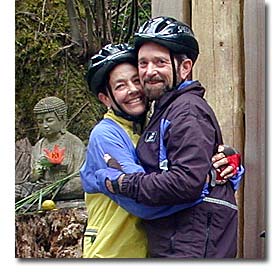 Marv: When my wife,
Maria, was diagnosed with breast cancer, I remained the complete optimist — throughout the myriad of tests, biopsies, etc..
There was no way that Maria had breast cancer; it just wasn't
an option. Marv: When my wife,
Maria, was diagnosed with breast cancer, I remained the complete optimist — throughout the myriad of tests, biopsies, etc..
There was no way that Maria had breast cancer; it just wasn't
an option.
This bubble was burst by one look at the face of our
friend, Ron, the pathologist who read the slides from her final
biopsy.
The next few weeks were total chaos. Meetings
with oncologists, treatment options, information overload, drug
studies, panic, denial. Much of it remains little more than a
blur. During that period we were joined at the hip, seeking information,
making decisions, trying to keep our imaginations from going
to dark places.
After what seemed like an eternity, all
of the decisions had been made and Maria began treatment, which
in her case consisted of a lumpectomy, chemotherapy (CAF) and
radiation. Her life centered around those treatments and all of the side
effects that came with it. She joined a support group, which proved
to be a tremendous resource for her.
I soon found myself along
the sidelines, wanting to help and be supportive, but becoming
more and more frustrated by the inability to do anything, or
worse yet to do anything right.
It was during this period that Bill Bowersock,
whose wife was in the same support group as Maria, came up with
the idea of starting a support group for men whose wives or partners
had breast cancer. When I first heard about it, my immediate reaction
was stereotypically male: Support group? I don't need no stinkin'
support group. Fortunately, Bill was very persuasive, and not
being able to come up with a legitimate reason to say no, I agreed
to join in. That was decades ago, and I made it to the weekly meetings until we moved to Idaho a while ago.
My initial hesitation proved to be completely
unwarranted. This wasn't the TV sitcom style group therapy session
I dreaded; no one was going to ask "and how does that make
you feel?" Instead, it was a group of guys who were (or
had been) in the same place I was, complete with all of the unknowns,
frustrations, worries, etc. It was a place to ask questions,
get answers to questions I hadn't thought to ask, and find comfort
in the realization that what I was experiencing was no different
than what everyone else was going through.
It helped me get through
one of the most difficult periods of my life, and continued to
provide an outlet for fears that surfaced every time Maria experienced
a strange pain or ailment, or a friend experienced a recurrence.
Maria: In the beginning, my husband Marv, with some hesitation, thought it might
be beneficial to talk with other men whose partners were going
through a breast cancer diagnosis and treatment. As the years ensued, Marv continued as an ever-present member of Man
to Man. His dedication to this group as a support and mentor
to other men, as well as a recipient of ongoing, caring, safe,
non-judgmental support, helped us in our life situations, whether
breast cancer-related or not.
I can sincerely say that Man to Man has
helped Marv and me through some really tough times when I was
diagnosed with breast cancer, and helped us be healing partners. We continue
to be on a growing and healing journey and I honestly feel that
his participation in Man to Man has helped enable us to continue
in this direction.
John Sundberg
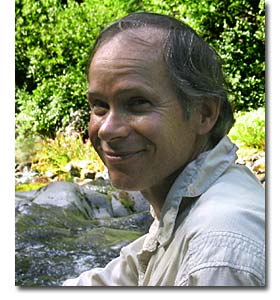 John: The Marin Man to Man support group for men whose wives have breast cancer entered my life one Wednesday morning just before my wife, Carol, was to begin chemotherapy for inflammatory breast cancer, an extremely aggressive form. John: The Marin Man to Man support group for men whose wives have breast cancer entered my life one Wednesday morning just before my wife, Carol, was to begin chemotherapy for inflammatory breast cancer, an extremely aggressive form.
Before breakfast arrived, I asked the group what chemotherapy was really like. I wanted to know their experiences. What I heard scared me so much I could hardly breathe, much less eat my breakfast.
They told me what I needed to hear, what no one else could. I really appreciated their honesty. I needed to stop living in the "it's not happening to me" world and face the reality of chemotherapy and breast cancer, so that I could be there to support my wife.
This healthy dose of reality helped me accept the fact that the cancer Carol had would change our lives forever. And I realized that we only had four days left before the chemo would begin. I took the next four days off from work and spent them with Carol getting ready for the treatment and the side effects.
But we also spent time together just holding each other, walking on the beach, and talking about our hopes and dreams together. When chemotherapy started, our lives were never the same again.
The battle against Carol's breast cancer was horrendous. She went through multiple chemo treatments, a mastectomy, and numerous radiation treatments for about a year and a half.
During this time I continued to attend my breakfast support group once a week. I needed the companionship, hope and reality provided by the group, who had all been through many of the same experiences I was going through.
The group had good ideas about medical treatments and opinions about local doctors and hospitals.
Best of all, I could just be myself in the group. I could be discouraged, frustrated or angry, and it was OK. One of the members of the group even came to sit with me in the hospital during Carol's mastectomy.
Unfortunately, the treatments were unsuccessful and Carol died. The group was there with me at Carol's memorial service. And I kept going to the weekly breakfasts for several years. They invited me to their homes for dinner, and helped me begin to feel alive again.
I subsequently moved to the country and took an early retirement from work. I do not make it to the weekly morning breakfasts any longer. But this group of courageous men helped me find the courage and strength to make it through an extremely difficult battle with breast cancer and the loss of Carol. I feel very fortunate to have had this support group and to have known these special guys.
Dan Goltz / Carol
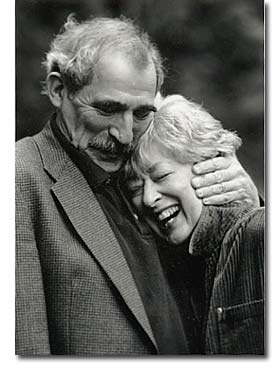 Dan : It was Christmas Eve. Carol and I were busily preparing
for a dinner party. Son David and his wife's family were our
guests. Five p.m., everything was ready, and Carol was ready
to dress for the party. The phone rang. Carol answered it. She
greeted the caller, and then listened to her oncologist tell
her, "You have one positive lymph node." Dan : It was Christmas Eve. Carol and I were busily preparing
for a dinner party. Son David and his wife's family were our
guests. Five p.m., everything was ready, and Carol was ready
to dress for the party. The phone rang. Carol answered it. She
greeted the caller, and then listened to her oncologist tell
her, "You have one positive lymph node."
What a night. Little did I know that this
was the beginning of a new phase in our life. The lumpectomy,
node dissection, chemo and radiation hit like a tornado, whirling
us into a terrible depression. Carol suffered the pain and discomfort,
but I felt the ever-present fear that my wonderful wife could
die. It was devastating.
After months of my depression, Carol told
me about Marin Man to Man. Knowing that I was not a joiner, she
urged me to see what it was all about. I knew that I needed to
do something, so a couple of Wednesdays later, I showed up full of apprehension about meeting new people I
assumed would be as miserable as I was.
But it wasn't that way at all. Since I
had called ahead, they were expecting me, and they gave me a
warm welcome. To my surprise, I was able to talk freely about
how I felt. The other men listened, asked questions and gave
me advice. They were warm and friendly, giving me my first gleam
of hope that maybe things could turn out OK.
I was sold on this new experience of telling
people how I felt about a very intimate and personal problem.
Over the years, I have seldom missed
the few hours we get together. We enjoy a feast
of ideas, humor, caring, comradeship and support.
Years after our first experience with breast cancer, Carol had a second bout — not a recurrence but a whole new strain. I'm a big baseball fan so it was natural for me to think, "Wow, this is like playing a doubleheader. But we were able to win the first one, so we should be able to win this one, too." And we did.
Marin Man to Man helped me live through
a very low point and my life. But more importantly, I have made
wonderful lasting friendships.
Carol: From the moment Dan learned of my diagnosis,
he apparently took charge of his own emotions and became my staunchest
ally. He accompanied me to doctors' appointments, waited patiently
during my lumpectomy, and even brought roses to me in the outpatient
surgical ward. He was there for the radical node dissection,
he was my buddy for each chemotherapy session, and he made sure
everything was being done correctly for the beginning radiation
sessions.
However, he must have felt isolated during
those times; after all, I was getting all the attention and he
really had no one else in whom to confide. One day as I was leaving
my radiation appointment, I noticed a flyer for meetings of a
group with husbands with wives with breast cancer. Now, Dan had
never been in a support group, but I thought he might consider
this one. And what a surprise; he went to the very next meeting,
and has continued going regularly every week.
He found great support, and discovered to his delight
that the guys didn't spend all their time moaning about their
wives. He came home buoyed by contacts with these hitherto-unknown men. Eventually one of the wives suggested a pot-luck dinner
so the wives could meet each other also, and that evening was
a night to remember. We could laugh at the same grotesque jokes,
and realized once again that we were not alone.
Dan has made close friends in the group,
and so have I. I can't think of a more healing process for
any man whose wife or partner has breast cancer. Friendly and
genuine group support just takes all the fear out of the situation,
and, hey — if guys want to talk about sports or cars or politics,
that's also great support. |

